Travel

COMPLETELY BY COINCIDENCE, travel writer and translator Shahnaz Habib once joined thousands of pilgrims in Lalibela, Ethiopia. Habib’s trip happened to overlap with Ethiopian Christmas, which brings Ethiopian Orthodox Christians from across the country and world to the town, famous for its medieval rock-hewn churches.
Detailing her experience in her book Airplane Mode, a personal history of travel with a sharp eye for the colonial legacies in tourism, Habib calls Lalibela’s churches “marvels of subterranean engineering.” Carved from red volcanic rock, they sit embedded in the ground, connected by tunnels. The complex of structures was built in the 12th century as an homage to Jerusalem, complete with replicas of Christ’s Nativity crib and tomb.
Habib observed as her fellow travelers lined up around the churches to kiss crosses offered by priests: “A kiss at the top of the cross, a kiss at the bottom, a touch of the cross to the forehead. Hundreds of kisses every hour.” She noted the procedural quality of the ritual.
“To lose oneself in a crowd. To walk the beaten path. To wait and be bored,” she writes. “Perhaps what separates the tourist and the pilgrim is not the reasons for their travel but the satisfaction that the pilgrim finds in what frustrates the tourist.”

Though Thanksgiving 2020 isn’t canceled—like just about everything else this past year—it needs to be different. Because of this, it is currently not safe to travel or gather in the ways many of us typically do. This need to do differently has left many Christians split and pitted against one another.
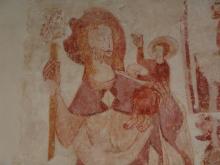
What I did not tell my friend, even as I thanked her, is that just as Christopher has become less churchy, so have the rest of us. I did not say that I’m not quite comfortable with religious jewelry in general, and in this case, don’t even wear the medal for safe passage. Instead, St. Christopher is a reminder of beautiful imperfection and radical acceptance — the patron saint of just right.

I knew this was going to be a great trip. I did not know it would afford me a chance to scratch off the top item on my bucket list.
But when the iconic gospel singer Bobby Jones met with the band of international journalists I am traveling with on a fellowship from the East-West Center, he mentioned the song “Oh Happy Day” was so popular among his fans in Russia, Italy and Japan that he can’t get offstage there without singing it.

WHEN YOU WORK for a Christian justice organization, it’s hard to complain about your petty personal problems. Dishwasher leaving spots on the glassware at home? Don’t mention it in the office or you get called out for a “First World problem.” Not happy with your cable company? “Dude, First World problem!” retorts a colleague, pouring coffee into his Amnesty International mug before a meeting on income inequality.
I work with people who have traveled the world working for peace and freedom, who have spent time in jail for their beliefs, but who show no sympathy when L.L. Bean messes up my order. (I purchased the medium winter pullover from their activewear collection, but they sent me a small. And it pinches when I lift my arms to pray during chapel.)
In short, my peers are saints working for a better world. And fortunately for them, they don’t have to look outside the office to see what’s wrong with that world, for I walk among them. I am he (or maybe him), the self-centered manchild whose personal preoccupations give a counterbalance to the righteous intentions of my colleagues. It’s a dirty job, but somebody’s got to do it.
And that somebody needs new kitchen cabinets.
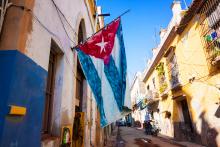
THOUGH SOME HAVE accepted “axis of evil” characterizations of Cuba and North Korea, my experiences of the two countries—nine visits to Cuba and one week in North Korea—have led me to far different conclusions: There are very few similarities between the two nations, and neither is inherently “evil.”
Music infuses the air in Cuba as in no other of the 60 countries to which I’ve traveled. The streets are alive. Children play baseball and soccer in the streets. Cafes, parks, and other public places are crowded and noisy. Nearly everyone I’ve met has treated me like a long-lost friend, even more so when they learn I’m American. There is a natural affinity between Cubans and Americans. More than 100 flights a week ferry people between Havana and Miami.
In North Korea, the streets are eerily quiet. There is virtually no visible human interaction. North Koreans are forbidden to make eye contact with Westerners. There appear to be no public gathering places except the massive government plazas where military parades and government rallies are staged. I was never allowed to go anywhere without a “minder.” I traveled with a Presbyterian Church (U.S.A.) official who was born in North Korea and returns there frequently. His counsel: “Assume that everywhere you go you are followed and that every conversation you have, no matter where, is bugged.” His relatives received permission to travel from their home village to Pyongyang to visit him. In our hotel room, he turned the television volume up to full blast before they began talking quietly. On one early morning walk near our hotel (the only time I was unescorted), I took a few photographs. By the time I returned to the hotel, government representatives were waiting in the lobby, demanding to see all my photos and instructing me on which ones to delete.

AS LINUS ONCE pointed out, Charlie Brown could turn a wonderful thing like Christmas into a problem.
Well, America’s post-industrial economy, in which the children of middle-class families frantically compete for slices of a shrinking pie, has done Charlie Brown one better: Our culture has managed to turn children’s sports into a problem. More and more, the fun and games of bygone days are being displaced by a network of pay-to-play competitive club sports organizations—gated communities of the youth sports world that are marketed to middle-class parents as the only route to coveted college athletic scholarships.
Two sets of statistics tell the story. As of 2010, according to the Columbus Dispatch, youth sports organizations took in at least $5 billion per year. In addition, according to a 2013 National Association of Sports Commissions study reported in the Dallas Morning News, the travel industry associated with youth sports is worth another $7 billion a year. And all that money is being spent on fewer kids. According to the Wall Street Journal, participation of kids age 6 to 17 in the most popular U.S. team sports fell by about 4 percent between 2008 and 2012 while the population of 6-to-17-year-olds fell by only 0.6 percent.
Competitive youth sports is becoming an elite phenomenon. Kids whose families can afford it spend the year migrating from tournaments to training camps. Meanwhile, the majority of kids just give up and stay home to play video games.
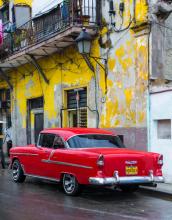
I just returned from a weeklong visit to Cuba. A team of seven people from First Baptist Church Greenville went to be with and learn from our partner church in Guanahay, Cuba — La Iglesia Bautista del Camino. After time in such a colorful country, here are some colorful thoughts of my own for three of our Cuban friends.
If Javier were a color, he would be blue. He is kind. "It is important to look each other in the eyes," he said on Easter morning. "So look into each others’ eyes, really, now, look into each others’ eyes, for at the end of the day you will be able to say that you have looked into the eyes of Christ."

GROWING UP IN the Catholic Church in Cuba, Romy Aranguiz learned to perform acts of charity on limited resources—and to carefully seek out dialogue when the laws of the land seemed to run contrary to her moral compass, or to the government's own professed ideals.
"For me, the church is the best representation of civil society in Cuba. It was probably the only institution that kept a certain distance from the government when there was hardly an opposition," she said in a recent phone interview from her home in Massachusetts.
Now a medical doctor in the U.S., Aranguiz continues to implement those lessons, these days through Cuban Americans for Engagement (CAFE), a movement aimed at broadening U.S.-Cuba relations through citizen exchange, open trade, and diplomatic cooperation.
Like most of CAFE's founding members, Aranguiz is a Cuban Gen Xer who obtained her education on the island and migrated to the U.S. as an adult. She developed a penchant for blogging while pursuing a professional career and obtaining U.S. citizenship.
CAFE's members are focused on breaking the silence they experienced in communist Cuba—and the silence they encountered as new immigrants to the U.S., where the Cuban-American agenda was often set by older exiles with no interest in a U.S.-Cuba dialogue.
"I think CAFE is having a positive impact on previous generations of Cuban Americans and Latinos in the U.S., descendants from first migratory waves," says CAFE board member María Isabel Alfonso, a professor at St. Joseph's College in New York. "CAFE has come to fill a void, as it values diplomacy and engagement over a confrontational, Cold War mentality."

We finally made it to the Oregon Coast yesterday. I took some pictures in the redwood forest that I’ll share soon, but this post isn’t about that.
We got in before dinner and were happy to learn that we had a hotel room with an ocean view. Not only that, but it actually is right on the beach. So of course, we decided to sleep with the windows open.
It’s one thing to fall asleep to the nature sounds on my iPad; it’s entirely another to drift into an alpha state to the real thing.
And then came the noise. It was this periodic buzzing/honking/humming that started sometime in the middle of the night. It sounded like someone snoring through the wall in the next room. Seriously? I drive two thousand miles to sleep next to the ocean and you’re going to keep me awake snoring?
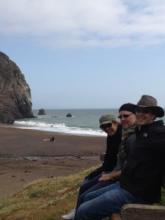
No great theological revelations today. No tear-jerking finale. No big mortal lesson. Just another step in a journey of a lifetime. ...
We’ve been in San Francisco the last couple of days, which is one of my favorite cities in the world. Driving here definitely hikes my blood pressure, but the sights, culture and food makes up for it.
Mostly we’ve continued to walk as much as possible. We’ve covered several miles every day, but my feet are evidence of the change of routine. Several blisters have emerged where there should just be calluses, and my plantar fasciitis decided to rejoin me in my heels after a brief, but welcome, sabbatical.

We just passed through Death Valley (insert 23rd Psalm joke here) and we’re about 100 miles from the edge of the world, also known as Los Angeles.
As my mind wandered while scanning the dunes and scrub brush, I started thinking back to the stories about my dad when he left home. As soon as he was old enough, he headed west with his mind full of images of the California orange groves. Coming from a small town outside of St. Louis, California might as well have been a world away, but he was resolved to get there, despite no plans for when he got there.
The whole point was just to get there. That, and to get away from his life in the Midwest. California still represented an escape from the mundane, a mecca of second chances, an eden of new beginnings…

We headed west toward Las Vegas this morning; chasing daylight toward the coast, leaving the kids in the care of grandma and grandpa.
I’ll give you one guess to figure out which one of us had a harder time leaving.
Personally, I know they’re safe at the farm, and they’ll have a lot more fun there than they would with us, driving a couple thousand miles over the next two weeks. Of course I’ll miss them, but I’ve also been looking forward to some “grown-up” time for a while. More specifically, this trip is not something most people ever get to do, let alone parents of two young kids.
And before we get to Portland and take our positions in the Big Kid Church, this is our chance to be a little bit irresponsible and childish. We can stay up late if we want. I can eat 12 Slim Jims for lunch if the mood strikes— though to be honest, the white stuff you squeeze out of those things turned me off of Slim Jims decades ago.
But I could if I wanted.
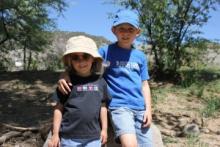
Amy’s mom, Suzie, and stepfather, Russ, live on a 12-acre apple orchard nestled against the Rio Grande in northern New Mexico. Instead of describing it, I decided to show it.
Enjoy.
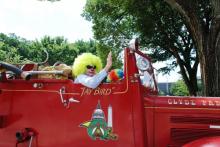
We’ve invested eight years of our lives into this community called Milagro Christian Church (Spanish for “Miracle”). As we have said many times before, it has our DNA throughout it. Our story is Milagro’s story. Our struggles and breakthroughs have been Milagro’s struggles and breakthroughs.
And now the paths are diverging, and although it’s exciting and necessary, there’s a part of it that really sucks.

It’s a simple joy – hoola hooping. And that seems to be the reason Carissa Caricato left her job to travel the world.
A few years ago when Carissa traveled to Haiti for earthquake relief efforts, she brought a few hoops to share with the children. Amidst the devastation she discovered the power in these simple hoops to bring people together and transcend barriers of language and culture.